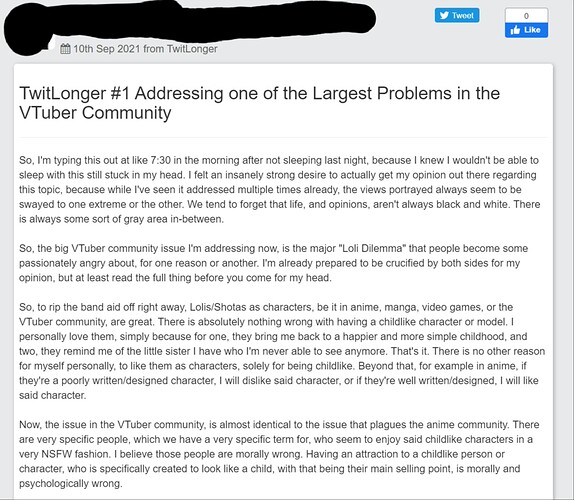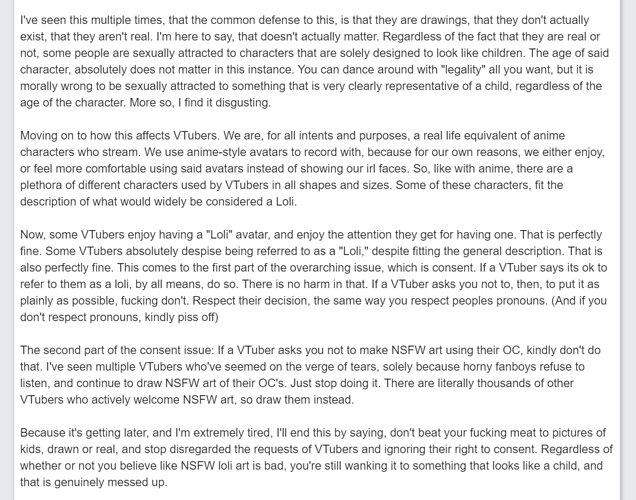(PLEASE DO NOT HARASS, CONTACT, TWEET AT, OR BERATE THE PARTIES CITED)
It should go without saying that antis and prudes simply cannot trump the simple truth that comes with the phrase “It’s just a drawing” with regard to the context of fictional/simulated pornography depicting what appear to be minors, such as the case with drawings, anime, manga, etc.
The fact that no real child, nor the identity of one, is implicated or exploited in any way is why such materials are, like adult pornography, legal in the United States as well as other countries.
No victims are created by its production.
No underlying crime is committed by its very creation.
No harm or abuse is caused by its existence or its consumption, nor does it increase risk of abuse, as both studies on the effects of pornography and sex crime statistics have consistently shown.
Research is being conducted to investigate the possible therapeutic effects behind the material’s consumption for high-risk or sensitive persons, as such materials are routinely used by pedophilic individuals as a safe outlet for sexual gratification and expression.
There is nothing ‘immoral’ or harmful, psychologically or otherwise, about being a pedophile or pedophiles indulging in their interests so long as they’re not harming or exploiting anybody.
Yet, I can’t help but notice these facts be mentioned and discarded, if not simply ignored when going through arguments by antis or dissenting parties.
Take this for example.
Without going into the details about anime or Vtuber culture and the ethics of drawing pornographic artwork of specific characters and the like, even without or against the creator’s wishes, I can safely and confidently say that none of that is all that relevant to my points at hand, but I feel the need to address it for brevity’s sake.
Vtuber avatars are simply that - avatars. Fictional characters that are designed to represent a person, group, organization, etc. They’re functionally indistinguishable from any other fictitious character one would create, and if you have fans, they will create artwork that is expressive of their feelings towards that character, regardless of whatever those feelings may be, even if (if not especially) in a pornographic/NSFW manner.
And it is completely their rights to do so.
If we were talking about the identities or likenesses of real people (especially if that person is a minor), fine.
You don’t need to create a moral argument or counterargument for why that’s bad or harmful to that person. Deepfakes have been used to harass and extort people and cause real damage to them, their reputation, and even their livelihoods. We can all sit there and laugh at the idea of a deepfake of a specific celebrity or public figure, but it’s another thing entirely to create one against their wishes, especially if such a thing would cause harm to them.
However, such a line of reasoning does not exist with Vtuber avatars. They’re cartoon characters, essentially digital puppets, subject to the whims and creative decisions of the creators and audiences. They can be modified, altered, withdrawn, or replaced at will.
There is no meaningful consequence that would justify controlling how such an entity is discussed or depicted. There isn’t any harm in creating such content, nor is it unethical for fans to create it, even after the creator of the character in question may have voiced their displeasure or desire for such content not to be made.
To equate the two, as if they’re in any way similar to the likeness of a real person, is beyond senseless, and fits right well within the theme of deliberately conflating real life and fantasy for the sake of moral coercion.
One can argue that creating such artwork and sending it or showing it to the person in question after they’ve requested that such things not be is unethical and ‘immoral’, but that falls in line with a harassment rationale. The issue therein lies not with the artwork’s creation or existence, but with how it is being used to grief someone.
Moving on.
What particularly irks me about this post is the way the writer says in response to it being fictional:
“It doesn’t matter if it’s not real, it’s still immoral”
Yet they do not explain themselves.
They do not expand upon how a fictional cartoon could somehow be immoral.
They fallaciously assume that such interests in these characters must be reflective of a sexual interest in real children.
Even in cases where such an interest reflective of an interest in real children, they fail to explain their “psychological” point any further, indicative of an uninformed layperson’s understanding of pedophilia and how it works, as even the DSM-5 draws a line between pedophilia and pedophilic disorder.
They expect their fears, prejudices, and opinions to magically resonate with whoever is reading it.
Moral coercion like this is effective at convincing people without having to actually convince them. Rather than put forth a meaningful argument, it appeals to a socially-induced projected guilt which invokes an unpleasant emotional association with the subject matter and, by extension, intimidates them, as such moral coercion works by presenting the illusion that their position is popular, therefore it’s right, when if it’s wrong or illogical, wherein social consequences may ensue if they do not adjust their position.
This slimy and manipulative rhetoric is much like Dry propaganda posters from the years leading up to Prohibition, where voters who were against banning alcohol were painted as supporters or allies of immoral, gluttonous, abusive and greedy drunkards, rather than aligned with the interests of honest, sober, Christian men and women whose lives were being destroyed by the evil of alcohol. I call it slimy because the Dry movement wasn’t interested in the well-being of the community, but rather just the eradication of what they perceived to be a vice, so much so that, to them, attitudes preaching “moderation” over prohibition were synonymous with opposition, and opposition was synonymous with immorality and deviance.
Dries and other proponents of prohibition wouldn’t dare admit the ugly reality that prohibition was predicted to (and did) bring, nor would they admit that, prior to enactment, their willingness to put poison in alcoholic substances to deter their consumption, causing thousands to suffer blindness or death, only stating that it was “for society’s own good” that drinkers suffer and die this way. If my memory serves correctly, Dries went out of their way to use moral coercion and intimidation as a means to silence and socially and politically disenfranchise their critics.
This isn’t to say that this post is the raw equivalent to Dry propaganda. Not in the slightest, but I wrote that part to illustrate the dangers of falling for moral coercion and why being able to identify it is so imperative.
If they have to justify censorship of fiction with “morality”, they’re wrong.

